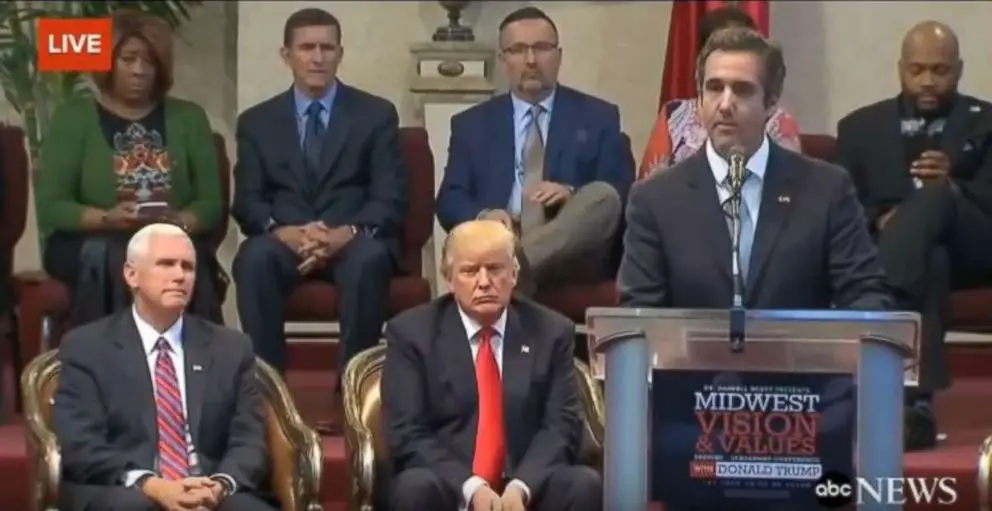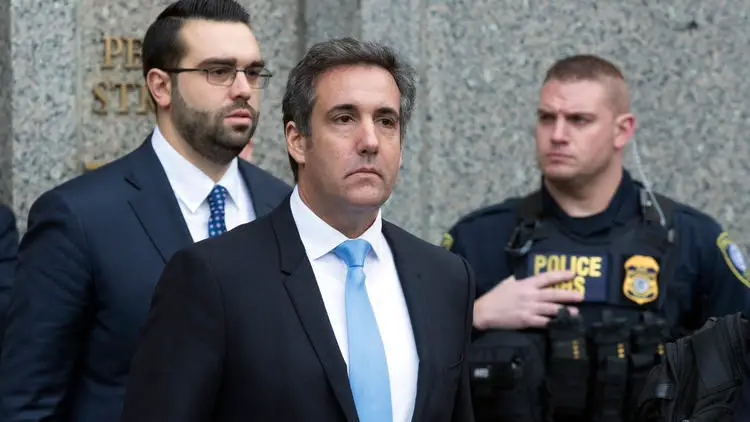Since Trump came into office two years ago, countless politicians have found themselves under the microscope as the world discovers new, typically scandalous secrets in their lives. The most recent person of interest is Trump’s personal lawyer, Michael Cohen.
Cohen has come under fire recently; in February, it was discovered that he had paid porn star Stormy Daniels $130,000 of his own money to keep her quiet about her affair with the president. On April 9, the FBI conducted a raid on the lawyer’s home, his office and his Park Avenue hotel room. They seized business records, emails and documents relating to several topics — including his payment to the porn star.
The raid engendered quite a bit of controversy, which lit up the nightly news for weeks. Sean Hannity, during his nightly segment, declared that special counsel Robert Mueller’s “witch hunt investigation is now a runaway train that is clearly careening off the tracks.”
President Trump also reacted vehemently. At four in the morning on April 10, he tweeted that “Attorney-client privilege is dead!” He followed this declaration with a second tweet one minute later, saying “A TOTAL WITCH HUNT.”
While the results of the raid have yet to publicaly surface, they could have serious consequences for the legitimacy of our leaders and our democracy at large. Following the raid, what TV host Jimmy Kimmel called the FBI’s “most dramatic and aggressive move on the White House yet,” several questions come to mind.
First, do the raids actually have implications for the legal system? Are they indeed the breach of attorney-privilege, as President Trump claims they are? What consequences will the raids have for our political leaders? And, last but not least, where the hell does Sean Hannity fit into all of this?
The Legality Of It All
According to Michael Cohen, the raid on his properties resulted in the violation of “protected attorney-client communications.” In order to properly discuss the implications of this statement, one must first define what exactly attorney-client privilege is.
The term refers to the legal privilege that protects communications between an attorney and their client. According to the U.S. Supreme Court, the privilege encourages the client to truthfully confide in their lawyer, who can then best provide effective advice and representation.
However, despite what the president may claim, attorney-client privilege is not dead. In fact, it’s probably safe to say that attorney-client privilege doesn’t exactly apply to this situation. As NPR’s Miles Parks explains, “attorney-client privilege rules, they don’t cover all communications between an attorney and the person they represent — only situations where the attorney is actually providing legal advice and situations where an attorney is actually not breaking the law in providing that legal advice by committing fraud or another crime.”
In order to safeguard this privilege, the materials from the FBI’s raid will first be processed by a so-called taint team, composed of a group of lawyers who are otherwise uninvolved with the ongoing investigation.
One CNN writer describes the taint team as “a protective buffer between an individual subject to a seizure and prosecutors when material is seized that may be privileged.” Before anyone else sees the material, the lawyers will select what material is appropriate for the prosecution to see. That way, the prosecution is not “tainted” with private information they have no right to see.
So, before you start arguing about the legal aspect of this debacle, keep this in mind. Whatever the president says, this raid won’t be setting any dangerous precedent for future cases; attorney-client privilege is still very much intact.
Is Trump in Trouble?

Legal issues aside, the Cohen debacle may have serious consequences for the president. Trump’s self-proclaimed fixer is currently facing a broad federal investigation into his business dealings and possible campaign finance violations. Whatever the end result of this investigation may be, it could reflect badly on the president.
Earlier this week, Harvard professor Alan Dershowitz told ABC news that prosecutors may have threatened Cohen with an extensive prison sentence if he fails to cooperate with their investigation.
Some people predict that Cohen, faced with the possibility of jail time, will flip and cooperate with the prosecution. Others say that the attorney, who has described himself as a man who would “take a bullet” for the president, will stay true to his longtime friend and protect Trump. For now, though, we’ll just have to wait and see how strong a case the prosecution brings against Cohen.
Nevertheless, there have been an increasing amount of evidence that Cohen has been hiding something important about the president. Over the weekend, Trump sent out a series of tweets, two of which read, “Most people will flip if the Government lets them out of trouble, even if … it means lying or making up stories. Sorry, I don’t see Michael doing that despite the horrible Witch Hunt and the dishonest media!”
As one New York Times article points out, “Trump said he believes Cohen will keep his mouth shut, not that Cohen can talk all he wants because there is no dirt to dish.” So, is Trump in trouble? Quite possibly. However, until Cohen takes the stand, there is no surefire way to tell.
Sean Hannity Gets Involved

You might know Sean Hannity as the news anchor of the popular Fox News segment, “Hannity.” What the world didn’t know until recently, however, was that he was also one of Michael Cohen’s clients.
Following this surprising revelation, Fox News executives offered Hannity their “full support,” despite being effectively blindsided by the news when it came out in a New York courtroom earlier this month.
However, others have criticized the TV host for not disclosing his relationship with Cohen while covering the news about the FBI raid and the lawyer’s workings with the president. Many worry that, given his personal relationship with Cohen, Hannity is biased in his coverage. “This is bad,” one Fox staffer said. “It violates every rule of journalism.”
Soon after this discovery, Hannity admitted his relationship with Cohen to his nightly viewers. The two men are friends, Hannity said, and Cohen has offered him occasionally advice about real estate. However, Cohen has never represented Hannity in any legal matters.
“My discussions with Michael Cohen never rose to any level that I needed to tell anyone that I was asking him questions, Hannity said, “and to be absolutely clear, they never involved any matter, any — sorry to disappoint so many — matter between me, a third party, a third group — at all.”
Although Hannity’s reputation has taken a hit, it seems that the host of “Hannity” will stay right where he is.
As to where this investigation will take us, the answer to that question is still very much in the air. There are, understandably, multiple variables at play: the prosecution, the president, Cohen’s prior dealings and his loyalty to the president. In the meantime, we can only wait and see.
Maybe this news will blow over, as many scandals have in the past. Maybe it could mean a disruption of our political system at the highest levels. In any case, with the integrity of our leader and possibly our democracy at stake, this story is well worth following.

















